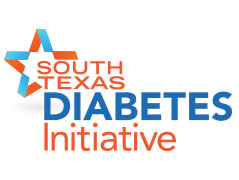South Texas Diabetes Initiative
About the Initiative
The South Texas Diabetes Initiative is a community-driven effort to improve patient health outcomes and lower costs for the entire health system through appropriate diabetes management in South Texas (Cameron, Hidalgo, Starr and Willacy counties). This network of healthcare professionals, business leaders, government officials and patients are dedicated to finding solutions to today’s complex diabetes problems in the South Texas community.
Why South Texas?
The prevalence of adult diabetes is more than 20 percent higher in South Texas than the entire state of Texas – close to 70,000 people have adult diabetes.
More than one quarter of all people with diabetes in South Texas have uncontrolled diabetes (25.1 percent, as defined by hemoglobin A1C levels greater than 8).
A greater percentage of adult diabetics visit the ER or hospital than the national average.
Individuals in South Texas are uninsured at a rate more than double the national average, and more than 25 percent of the diabetic population in South Texas is uninsured.
Through community-wide collaboration, our aim is to help improve health outcomes and decrease hospitalizations rates in South Texas.
Our Approach
We started from the ground up by talking with community members and healthcare leaders in South Texas to understand the barriers to appropriate diabetes care and management. Based on these conversations, the South Texas Diabetes Initiative is working to develop a plan that will:
Address cultural considerations that influence adoption of appropriate diabetes care
Include community-based interventions that have been evaluated and proven successful in other markets
Help physicians and other healthcare providers make necessary changes to their practice structure to facilitate better diabetes care and patient adherence
Help increase overall awareness of appropriate diabetes care among the patient population in South Texas
We’ve also created a centralized data resource for South Texas, which provides the most recent, comprehensive, localized diabetes prevalence and cost data. This tool has helped us to pinpoint the changes that we believe will make the greatest impact in South Texas, and will also help measure the overall success of the Initiative moving forward.
Community Partners Committed to Making a Difference
The South Texas Diabetes Initiative is built upon community-wide involvement and the commitment of all stakeholders to take action and make a difference. The success of the program relies on the dedication of South Texas’s patients, caregivers, healthcare providers, community officials and local business leaders to make a difference. The effort in South Texas is currently led by the following organizations:
Doctors Hospital at Renaissance
A state-of the-art hospital in South Texas dedicated to the provision of quality, compassionate and cost-effective patient care. Doctors Hospital proudly offers premier diabetes services through its branch of the Joslin Diabetes Center, the world’s preeminent diabetes research and clinical care organization.
University of Texas-Pan American
A Hispanic serving institution located in Edinburg, TX, provides program specific classes at various campus locations and through their online learning center. The university recently received a $6 million diabetes research grant to explore options for improving the state of diabetes in South Texas and beyond.
Diabetes Care Project (DCP)
A coalition of patient advocates and health partners whose goal is to educate patients, caregivers, healthcare providers and policymakers on the value of developing personalized management plans for diabetes patients in an effort to improve each patient’s health outcomes and lower costs for the entire health system. Roche Diagnostics and the National Minority Quality Forum are founding partners of the Diabetes Care Project (DCP). All partners of the DCP are committed to improving patient outcomes and advancing diabetes care and management.






